|
Kefalovryso, Trikala
Kefalovryso (Greek:Κεφαλόβρυσο, ) is a village in Trikala regional unit, Greece. In 2011 Kefalovryso had a population of 952. It is located 7 kilometers northwest of Trikala in the Thessalian Plain and close to the river Pineios. Population Early history (1163-1881) Kefalovryso's initial name was Mertzi or literally Mertzion (Greek: Μέρτζι/Μέρτζιον). The word Mertzi -by olders sometimes still in use as Mertsi- probably derives from the old Slavic word ''мрч'', which means dark/black and might refer to the dark color of the soil. The first official reference to Mertzi is in an 1163 document of the Holy Bishopric of Stagai, and it is again found in several 14th-century monastic property deeds. Mertzion, just like all Thessaly, was initially part of the Byzantine Empire. In 1204, after the Fourth Crusade, Thessaly was assigned to Boniface of Montferrat and in 1225 was conquered by Theodore Komnenos Doukas, ruler of Epirus. From 1271 to 1318 it was a ... [...More Info...] [...Related Items...] OR: [Wikipedia] [Google] [Baidu] |
Thessaly
Thessaly ( el, Θεσσαλία, translit=Thessalía, ; ancient Thessalian: , ) is a traditional geographic and modern administrative region of Greece, comprising most of the ancient region of the same name. Before the Greek Dark Ages, Thessaly was known as Aeolia (, ), and appears thus in Homer's ''Odyssey''. Thessaly became part of the modern Greek state in 1881, after four and a half centuries of Ottoman rule. Since 1987 it has formed one of the country's 13 regions and is further (since the Kallikratis reform of 2011) sub-divided into five regional units and 25 municipalities. The capital of the region is Larissa. Thessaly lies in northern Greece and borders the regions of Macedonia on the north, Epirus on the west, Central Greece on the south, and the Aegean Sea on the east. The Thessaly region also includes the Sporades islands. Name and etymology Thessaly is named after the ''Thessaloi'', an ancient Greek tribe. The meaning of the name of this tribe is unknow ... [...More Info...] [...Related Items...] OR: [Wikipedia] [Google] [Baidu] |
Aetolia
Aetolia ( el, Αἰτωλία, Aἰtōlía) is a mountainous region of Greece on the north coast of the Gulf of Corinth, forming the eastern part of the modern regional units of Greece, regional unit of Aetolia-Acarnania. Geography The Achelous River separates Aetolia from Acarnania to the west; on the north it had boundaries with Epirus and Thessaly; on the east with the Ozolian Locrians; and on the south the entrance to the Corinthian Gulf defined the limits of Aetolia. In classical times Aetolia comprised two parts: "Old Aetolia" ( el, Παλιά Αιτωλία, Paliá Aitolía) in the west, from the Achelous to the Evinos, Evenus and Calydon; and "New Aetolia" ( el, Νέα Αιτωλία, Néa Aitolía) or "Acquired Aetolia" ( el, Αἰτωλία Ἐπίκτητος, Aitolía Epíktitos) in the east, from the Evenus and Calydon to the Ozolian Locrians. The country has a level and fruitful coastal region, but an unproductive and mountainous interior. The mountains contained m ... [...More Info...] [...Related Items...] OR: [Wikipedia] [Google] [Baidu] |
Evangelos Averoff
Evangelos Averoff-Tositsa (Greek: Ευάγγελος Αβέρωφ Τοσίτσας) (Trikala, 17 April 1910 – Athens, 2 January 1990) was a Greek politician, leader of the right wing party New Democracy (1981–1984), member of parliament, and author. Life and work Evangelos Averoff was an Aromanian. Averoff got involved in public matters from very early on in his life and played a major role in Greek politics for almost 50 years. In 1940 he was appointed Prefect (regional governor) of Kerkyra (Corfu). During the tripartite Axis occupation of Greece, Averoff was taken hostage and imprisoned in Italy. He escaped a year later and created the " Freedom or Death" resistance group, which aimed to liberate Greek and Allied war hostages. In 1946, he was elected to the Greek Parliament as a representative of Ioannina and then went on to serve as deputy minister and minister of Supply, Economy and Agriculture. From 1956 to 1963 he served as Foreign Minister. During the Greek milita ... [...More Info...] [...Related Items...] OR: [Wikipedia] [Google] [Baidu] |
Metsovo
Metsovo ( el, Μέτσοβο; rup, Aminciu) is a town in Epirus, in the mountains of Pindus in northern Greece, between Ioannina to the west and Meteora to the east. The largest centre of Aromanian (Vlach) life in Greece, Metsovo is a large regional hub for several small villages and settlements in the Pindus region, and it features many shops, schools, offices, services, museums, and galleries. The economy of Metsovo is dominated by agriculture and tourism, the latter of which flourishes in winter. Metsovo is served by Greek National Road 6 (Ioannina – Trikala) and by the Egnatia Odos motorway. Etymology From medieval times till well into the 19th century, Metsovo was known, in various sources, as ''Metzovo''. From the end of the 18th century on, the literary form of ''Messovon'' makes its appearance. The town is known as ''Aminciu'' in Aromanian (Vlach), and as ''Miçova'' in Ottoman Turkish. Ottoman census records In the Ottoman census records we see the word ''Mcwh'' ... [...More Info...] [...Related Items...] OR: [Wikipedia] [Google] [Baidu] |
Greek War Of Independence
The Greek War of Independence, also known as the Greek Revolution or the Greek Revolution of 1821, was a successful war of independence by Greek revolutionaries against the Ottoman Empire between 1821 and 1829. The Greeks were later assisted by the British Empire, Bourbon Restoration in France, Kingdom of France, and the Russian Empire, while the Ottomans were aided by their North African vassals, particularly the eyalet of Egypt Eyalet, Egypt. The war led to the formation of modern Greece. The revolution is Celebration of the Greek Revolution, celebrated by Greeks around the world as Greek Independence Day, independence day on 25 March. Greece, with the exception of the Ionian Islands, came under Ottoman rule in the 15th century, in the decades before and after the fall of Constantinople. During the following centuries, there were sporadic but unsuccessful Ottoman Greece#Uprisings before 1821, Greek uprisings against Ottoman rule. In 1814, a secret organization called Filiki Et ... [...More Info...] [...Related Items...] OR: [Wikipedia] [Google] [Baidu] |
Ottoman Empire
The Ottoman Empire, * ; is an archaic version. The definite article forms and were synonymous * and el, Оθωμανική Αυτοκρατορία, Othōmanikē Avtokratoria, label=none * info page on book at Martin Luther University) // CITED: p. 36 (PDF p. 38/338) also known as the Turkish Empire, was an empire that controlled much of Southeast Europe, Western Asia, and Northern Africa between the 14th and early 20th centuries. It was founded at the end of the 13th century in northwestern Anatolia in the town of Söğüt (modern-day Bilecik Province) by the Turkoman tribal leader Osman I. After 1354, the Ottomans crossed into Europe and, with the conquest of the Balkans, the Ottoman beylik was transformed into a transcontinental empire. The Ottomans ended the Byzantine Empire with the conquest of Constantinople in 1453 by Mehmed the Conqueror. Under the reign of Suleiman the Magnificent, the Ottoman Empire marked the peak of its power and prosperity, as well a ... [...More Info...] [...Related Items...] OR: [Wikipedia] [Google] [Baidu] |
Serbs
The Serbs ( sr-Cyr, Срби, Srbi, ) are the most numerous South Slavic ethnic group native to the Balkans in Southeastern Europe, who share a common Serbian ancestry, culture, history and language. The majority of Serbs live in their nation state of Serbia, as well as in Bosnia and Herzegovina, Croatia, Montenegro, and Kosovo. They also form significant minorities in North Macedonia and Slovenia. There is a large Serb diaspora in Western Europe, and outside Europe and there are significant communities in North America and Australia. The Serbs share many cultural traits with the rest of the peoples of Southeast Europe. They are predominantly Eastern Orthodox Christians by religion. The Serbian language (a standardized version of Serbo-Croatian) is official in Serbia, co-official in Kosovo and Bosnia and Herzegovina, and is spoken by the plurality in Montenegro. Ethnology The identity of Serbs is rooted in Eastern Orthodoxy and traditions. In the 19th century, the Serbia ... [...More Info...] [...Related Items...] OR: [Wikipedia] [Google] [Baidu] |
Catalan Company
The Catalan Company or the Great Catalan Company (Spanish: ''Compañía Catalana'', Catalan: ''Gran Companyia Catalana'', Latin: ''Exercitus francorum'', ''Societas exercitus catalanorum'', ''Societas cathalanorum'', ''Magna Societas Catalanorum'') was a company of mercenaries led by Roger de Flor in the early 14th century and hired by the Byzantine Emperor Andronikos II Palaiologos to combat the increasing power of the Anatolian beyliks. It was formed by '' almogavar'' veterans of the War of the Sicilian Vespers, who had remained unemployed after the signing in 1302 of the Peace of Caltabellotta between the Crown of Aragon and the French dynasty of the Angevins. Origin The military demands of the Reconquista stimulated the formation of the elite light infantry known as the ''almogavars'' on the Iberian peninsula during the 13th century. These troops were used quite effectively by the Crown of Aragon for other imperial ventures in the Mediterranean, particularly the War of the ... [...More Info...] [...Related Items...] OR: [Wikipedia] [Google] [Baidu] |
Almogavars
Almogavars ( es, almogávares, an, almugávares, ca, almogàvers and pt, almogávares ar, Al-Mugavari) is the name of a class of light infantry soldier originated in the Crown of Aragon used in the later phases of the Reconquista, during the 13th and 14th centuries. Almogavars were lightly clad, quick-moving frontiersmen and foot-soldiers. They hailed from the Kingdom of Aragon, the Principality of Catalonia, the Kingdom of Valencia, the Crown of Castile and the Kingdom of Portugal. In the Crown of Castile, the inner organization was managed by King Alfonso X of Castile in the Siete Partidas. At first these troops were formed by farmers and shepherds originating from the countryside, woods and frontier mountain areas. Later, they were employed as mercenary, mercenaries in Italy, Latin Greece and the Levant. Etymology There are several theories as to where this name comes from ar, المغوار; pl. ar, المغاوير, ''al-mughāwir'', lit=Raiders, or ''al-mukhābir'' ... [...More Info...] [...Related Items...] OR: [Wikipedia] [Google] [Baidu] |
Acarnania
Acarnania ( el, Ἀκαρνανία) is a region of west-central Greece that lies along the Ionian Sea, west of Aetolia, with the Achelous River for a boundary, and north of the gulf of Calydon, which is the entrance to the Gulf of Corinth. Today it forms the western part of the regional units of Greece, regional unit of Aetolia-Acarnania. The capital and principal city in ancient times was Stratos, Greece, Stratos. The north side of Acarnania of the Corinthian Gulf was considered part of the region of Epirus. Acarnania's foundation in Greek mythology was traditionally ascribed to Acarnan, son of Alcmaeon (mythology), Alcmaeon. History Pre-Peloponnesian War The name of Acarnania appears to have been unknown in the earliest times. Homer (8th century BC) only calls the country opposite Homer's Ithaca, Ithaca and Cephalonia, under the general name of "Epeirus" (῎ηπειρος), or the mainland, although he frequently mentions the Aetolians. The country is said to have been origi ... [...More Info...] [...Related Items...] OR: [Wikipedia] [Google] [Baidu] |





